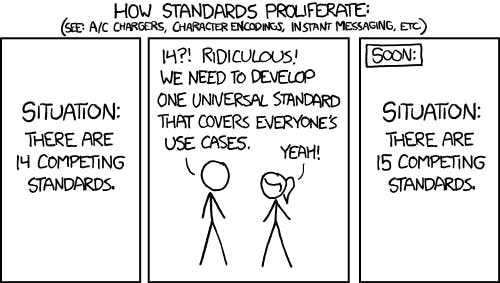Introducing the Standards Working Group
The OpenJS Foundation helps critical open source projects succeed by leveraging skills from lots of people.

Introducing the Standards Working Group
This post was written by the OpenJS Foundation Standards Working Group.
The OpenJS Foundation helps critical open source projects succeed by leveraging skills from lots of people. In addition to code contributions, projects need to issue reports, provide quality assurance, write documentation, do developer outreach, project management, and planning.
To provide projects with even more support and resources, the OpenJS Foundation’s Cross Project Council has chartered a new working group. The Standards Working Group will actively monitor evolving standards to support and educate OpenJS Foundation projects about developments that might affect them. The group will also help projects formulate standards strategies and advance them with the appropriate standards development organization.
Standards are important to OpenJS Foundation Projects
Many OpenJS projects, like jQuery and Node.js, have a long history of participating in and influencing standards. But what are “standards” and why do they matter to projects?
Standards are agreements between multiple parties about how a specific technical implementation will work. For example, JavaScript API standards help browsers agree on how a web page should appear to the person sitting in front of the screen. Standards also balance interests. You, viewing this document in your browser, have an interest in being able to pick a browser that you like and having it work with many web pages. We, the authors, have an interest in being able to produce one document that works in many browsers. Users who need assistive technologies like screen readers have an interest in those being able to integrate with browsers. Researchers have an interest in being able to understand technical corner cases that might affect privacy and security.
Standards development organizations, or “standards bodies,” are neutral forums for people to create and maintain these agreements. Done right, a standards body brings people with diverse interests together in a way that helps the group be better stewards of end users’ interests.
Standards processes are challenging
In some cases, a standards-making group is not able to come to an agreement and the process fails. Or worse, a group of stakeholders isn’t a truly diverse and representative population of stakeholders.
As a result, the produced standard isn’t a true agreement. “If only we’d been included in this work 5 years ago!” and “If only we’d known earlier – we wouldn’t have spent so much time building our thing in a way that wasn’t interoperable with your thing!” are the unfortunate refrains of a standards making effort that may well fail – wasting a lot of time (and effort) because all the stakeholders weren’t at the table.
For example, an earlier lack of consensus and adoption of health IT standards created a barrier to healthcare data interoperability. This made it very difficult for health care providers and researchers to share data, and locked research institutions and hospital systems into a specific vendor’s solutions. Global stakeholders have now converged around the HL7 FHIR standard that promises to deliver better outcomes at lower costs, but it has taken years to start to see this progress.
The Standards Working Group can help
Collectively, the OpenJS Foundation Standards Working Group members have 50+ years of experience with technology standards, with an emphasis on web standards including those that define the languages and networking protocols that make up the web (CSS, HTML, JavaScript, DNS). We also have members with expertise on topics that come up often in application development, including security, privacy, internationalization, localization, accessibility, user experience, and API (Application Programming Interface) design.
Project maintainers and contributors are experts in their projects’ needs and goals (among many other things). The Standards Working Group actively monitors standards work items to help projects stay informed about issues or decisions that may affect them. The group also helps demystify the process. Standards organizations can be confusing and intimidating, but the Standards Working Group can answer questions, connect people, and help projects figure out how to get its needs considered.
If you’re concerned that standards making is intimidating, you’re not alone. Most of our members had the same impressions at first:
“I had imposter syndrome. It seems overwhelming at first, but the best way to learn and get comfortable is to get involved.”
But over time and with mentorship, they gained the confidence they needed to be successful in the standards arena:
“I thought, going in, that I’d have to present to people who all knew more than me. But most of them remember being in the same boat, so you can go, listen, and talk about what you know to whom you choose until you’re comfortable doing more.”
The Standards Working Group can advise projects to help set them up for success. For example, sometimes rephrasing a proposal so that its non-essential features look more like previously accepted proposals makes it easier to digest. The group can also help projects set expectations correctly – getting a diverse group to agree can take time. Knowing how long a similar kind of proposal has taken in the past may help planning. For individuals who want to learn how to best participate in standards activities, the Working Group provides time-tested guidance.
Get support or get involved
If you’re interested in joining the Standards Working Group, or would like some assistance or mentorship for your project, say hello in the OpenJS Foundation’s #standards Slack channel.
The group also holds bi-weekly meetings that are livestreamed on YouTube, or you can join the meetings yourself by following the /standards repository. OpenJS Foundation’s bi-weekly Office Hours are another way to connect with us start onboarding.
You are also welcome to reach out to any working group member for more insight or support – we hope you’ll connect with us and let us know how we can support you or your open source project participate in the standards arena!